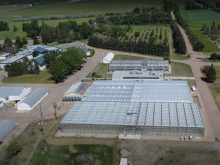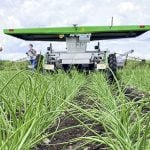With one eye on the changing farm economy and another on the demands of students wanting to break into the industry, Western Canada’s agricultural schools are being forced to change their focus.
“The (loss of the) Crow Benefit has been just one more change that’s part of prairie agriculture in the past period of time,” said University of Saskatchewan College of Agriculture dean John Stewart. “We have found … that our students required a revised curriculum.”
Now, instead of learning only about cows or canola, students develop farm business plans, learn about international trade and study theories of consumer demand.
Read Also

Heat waves combine sunshine and sinking air
As we continue our look at heat waves, I figured we should first define what they are by looking at the criteria Environment Canada uses to define heat events.
The University of Saskatchewan in Saskatoon, along with the University of Alberta in Edmonton and the University of Manitoba in Winnipeg, recently asked agri-businesses and university alumni if their programs offered students what they need to find a niche in a changing food industry.
In some cases, drastic changes were
recommended.
“As a result of those answers and some other pressures that we had around the university, we did a total curriculum review,” said University of Manitoba’s agricultural college dean James Elliot. “We sat down and said ‘OK, we’re going to start as if we had no curriculum at all.’ “
In the past, bachelor of science programs focused on specialized courses in such areas as animal or soil science. Students said they needed that knowledge and a lot more.
“We put in some of the things we got out of our survey: communications, agribusiness, required computer skills, critical thinking and ethics, production and utilization in food, marketing and distribution,” said Elliot.
Businesses like changes
Agriculture-related businesses were impressed with the consultation and the outcome.
“We’re comfortable with the new trends that the agricultural colleges have been taking to modernize their programs,” said Alain Gagnon, marketing manager of the Royal Bank’s national agriculture and agri-business office in Winnipeg. “In terms of the academic degrees, we’re satisfied with the current status of the ag grads.”
Lorne Hadley, regional manager of United Grain Growers in Saskatoon, agreed.
“The businesses that we run now are much more intense in terms of their management and they’re more intensive in terms of having a set of skills to do with budgeting and managing employees,” he said. “I haven’t seen any great gaps in what we’re getting from the universities and technical schools.”
The colleges gave particular attention to business and management skills.
“Across all disciplines, there’s a need to be able to understand and communicate and be able to deal with business,” said Stewart, of the U of S. “Everybody needs a business background at the present time, so we made it possible that even if you’re taking a degree in animal science, you can take a minor in business management.”
Scott Jeffrey obtained his agricultural undergraduate degree from the University of Guelph in 1982. He now is chair of the Bachelor of Science program in Agriculture/Food Business Management at the University of Alberta.
“There wasn’t really a management requirement (in my training),” said Jeffrey. “The management courses that I took were in the area of production management, a dairy science course or a beef production course where we learned technical aspects of management as opposed to the financial aspects or the ‘people’ aspects.”
Unlike most of his friends in agricultural school, Jeffrey did not go on to complete an agricultural degree in animal science. He chose the less-popular route of agricultural economics.
He has since completed a master’s degree at Guelph and a PhD in agricultural economics at the University of Minnesota.
New program formed
Jeffrey helped develop the new agricultural/food business management degree at the University of Alberta.
“We reshuffled all of the undergraduate programs about 1992 and what emerged from that was a new program which was agricultural/food business management.”
Ruth McGovern, a University of Alberta graduate student, believes mandatory business courses are an essential part of an agricultural degree course. “You have to be very practical when you start talking to producers, and you have to (understand) the profit side of everything you’re doing.”
Though they may not realize it at first, students enrolled in agricultural schools will appreciate the business skills they are now receiving, said Jeffrey.
“Students wonder why they have to take business courses,” he said. “Then they take it and understand. They still don’t necessarily like the course, but at least they can understand why they’re there.”
Graduates also are becoming more adept at communication and people skills. Students at the University of Saskatchewan are required to take subjects such as oral and written communications, which include technical and business correspondence, speech writing and parliamentary procedures.
And with their new “well-rounded” education, students are optimistic they will appeal to potential employers.
“I got a good chance of finding a job,” said Derek Foss, a University of Saskatchewan agronomy student with an agricultural economics minor. “I’m going to get a job and get some experience, and then go back to the farm when I’m older maybe … I could even farm during the year and get a job in the winter.”
Many students with rural backgrounds do not want to go back to the farm. Once they receive their degrees, they look to agri-businesses for jobs. Few return to the way of life their parents lived.
“When I finished (ag school) 15 years ago,” said Gagnon, “if you went back to the farm, it was a father-son type of relation. That was the only choice you had. Today if you’re a college grad, you can go and work for a farm corporation and you could actually do a professional job and not repair tractors and things.”
Increasing numbers of students also come from city backgrounds, so farming is not in their blood or their past.














